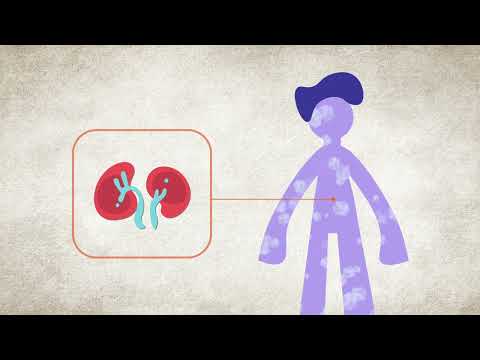
Understanding High Potassium Symptoms: The Silent Threat to Your Health
High potassium, or as the medical folks call it, hyperkalemia, is no joke, my friends! It can hang around like a pesky mosquito, manifesting through symptoms that might easily be brushed aside. If you wanna keep your body in top shape, understanding these signs is a must. Symptoms like muscle weakness, fatigue, and heart palpitations can put a serious dent in your goals—whether you’re training for a competition or just hoping to look great on the beach.
Let me break it down for you: high potassium levels usually arise from kidney dysfunction, certain medications, or just plain eating a lot of potassium-rich foods without balance. When your body goes haywire with potassium, it can lead to dangerous cardiac arrhythmias. So, don’t let these symptoms slide; they can escalate fast!

Top 7 High Potassium Symptoms You Should Never Ignore
Navigating the health game means being tuned into what your body’s telling you. Here are seven high potassium symptoms that should make you hit the brakes and take action:
This is one of the big red flags in hyperkalemia. Muscle weakness can start off as just feeling a bit off during your workouts but can escalate to something more sinister—like muscle paralysis. Imagine trying to crush your gym session and your body just won’t cooperate; that’s a no-go!
Feeling like a sloth even after a solid night’s sleep? That’s your body talking. Chronic fatigue could point to high potassium levels messing with your muscles. Research highlights that electrolyte imbalances can lead to ongoing tiredness. You can’t get shredded if you’re always dragging!
If your heart starts playing hopscotch with erratic rhythms, take heed! Palpitations can feel like your heart’s racing or skipping beats. This is no time to brush it off—get a medical evaluation ASAP! Your heart’s health is too important to ignore.
We’re all too familiar with gastrointestinal issues, right? Well, nausea and cramping can signal high potassium levels too. Studies indicate that potassium affects muscle contraction, impacting your digestive system’s rhythm.
Ever felt that annoying “pins and needles” sensation? Numbness or tingling in your extremities can be related to potassium affecting nerve signaling. If it’s creeping in and out, this one’s a sign you should not overlook.
When your body starts gasping for air, it might be the result of high potassium levels. This happens because your heart might struggle with oxygenation. If you find yourself huffing and puffing after a simple walk, dial it down and check up.
While chest pain can have many reasons behind it, be wary if it comes with other symptoms. This could spell trouble, especially regarding your heart health. You know your body best—listen to it!

The Connection Between High Potassium Symptoms and Drug Withdrawal Symptoms
Now, let’s get into the nitty-gritty of how high potassium symptoms can play ball with withdrawal symptoms. If you’re familiar with the alcohol withdrawal timeline, you know it can shake things up in your body, including your potassium. Heavy drinking can mess with your kidneys, causing potassium to spike.
On the flip side, marijuana withdrawal symptoms can also show up dressed as muscle cramps and fatigue. If you’re kicking a habit, it can be hard to distinguish between chronic withdrawal symptoms and those triggered by high potassium. Your body’s balance is tossed, so be mindful of it!

Recognizing Altitude Sickness Symptoms that Overlap with High Potassium Levels
If you’re an adventure junkie, listen up! Symptoms of altitude sickness often mirror those of hyperkalemia, especially muscle weakness and exhaustion. If you’re trekking through high altitudes and not acclimating properly, your potassium might take a hit due to dehydration. It’s crucial to recognize this crossover for your overall health.

Navigating Withdrawal and Health Monitoring: Tips for Prevention
Dealing with drug withdrawal can be messy! One proactive step is keeping tabs on your potassium levels. Detoxing can mess with your body, and high potassium isn’t something you want to overlook. Here are some solid tips to keep yourself in check:
Your Health Matters: Don’t Overlook the Signs
Taking care of your health isn’t just a side job; it’s a priority! High potassium symptoms can start as mild irritations but can escalate quickly into severe situations. This article isn’t just to scare you but to empower you! If you or someone you know is feeling unwell, don’t hesitate to seek medical help. Stay educated, stay aware, and most importantly, prioritize your health. It’s your body—let’s keep it in the best shape possible!
High Potassium Symptoms That Demand Your Attention
Spotting High Potassium Symptoms
High potassium symptoms can creep up on you like a thief in the night. When potassium levels get too high, they can signal some serious health issues. You might notice muscle weakness, fatigue, or palpitations. Think of it this way—your body’s balance can be as tricky as figuring out How many square Feet in a square yard. It’s essential to pay attention to what your body is telling you. Did you know that a small bowel obstruction can sometimes mimic these high potassium symptoms? It’s always a good idea to differentiate between the signs.
The A-1 Symptoms
While everyone’s a bit different, sore muscles and irregular heartbeat are the big ones to watch. Keeping tabs on your health is as crucial as knowing the abdominal aortic aneurysm Symptoms. And if you start experiencing digestive issues or feel like you’re on the fringes of good health, don’t brush it off! Symptoms like these can pop up outta nowhere, much like the plot twists in your favorite show like Peaky Blinders. And speaking of twists, did you know that the high potassium symptoms, if unchecked, can sometimes lead to extreme complications akin to understanding the chimera meaning? Don’t you want to stay ahead of something like that?
Keep an Eye Out
Curiosity often leads us to interesting facts. For instance, did you know that athletes often monitor their potassium intake closely due to its role in muscle function? It’s a bit like the trend of Vabbing among some folks, trying to enhance personal presence naturally! Where you get your potassium from is key, too—whether through food or omega 3 Supplements, just remember to keep your levels right. As we delve deeper, never underestimate the importance of self-care; it could make all the difference in spotting those high potassium symptoms early. Always keep your eyes peeled, stay informed, and your body will thank you for it!



























